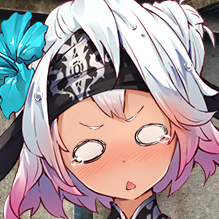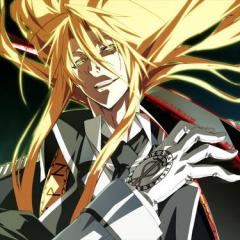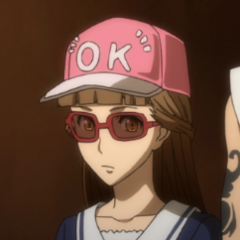Leaderboard
Popular Content
Showing content with the highest reputation on 10/22/20 in all areas
-

Tricky extraction of XP3 embedded in KiriKiri EXE. Ideas?
Mr Poltroon reacted to Darbury for a topic
My work here is done. Shut 'er down, boys!1 point -

Tricky extraction of XP3 embedded in KiriKiri EXE. Ideas?
Darbury reacted to Mr Poltroon for a topic
*twitches* Wait, this wasn't a very useful reply. My apologies. Feel free to tell me to bugger off and I'll even hide this.1 point -

Blog: Why is everyone reading Umineko the "wrong" way? [spoilers]
Mr Poltroon reacted to alpacaman for a blog entry
My guess is most readers fall somewhere in the middle between this and what I described above. I don't think we are very far apart on this actually and I admit I kind of failed to highlight the battle of wits aspect. It is definitely one of the things that make up a major part of the charm of the mystery genre. I'd still argue the fun in this kind of confrontation lies in the reader knowing the playing field and having a grasp on the basic rules and trying to figure out which "loophole" or which possibly tiny part of the puzzle the opponents are going to use to corner each other (I'm seriously jumbling metaphors here). It isn't just the "smart" part, it is that the solution is something you could found out yourself. The "ah, so that's what that clue was about" moment is very important imo. For example, a VN about Einstein fighting other leading scientists over the interpretation of certain aspects of quantum physics could be fun in its own way, but it would be very different from a Sherlock Holmes story.1 point -

Blog: Why is everyone reading Umineko the "wrong" way? [spoilers]
alpacaman reacted to Mr Poltroon for a blog entry
Not to discount your initial premise or the entire post, because I think what I will say won't disprove it or anything, but I'm somewhat willing to bet that the majority of people that read Umineko for the first time do not fit into the pattern you have described. Many, including myself, who are fans of the mystery genre are not actually interested in solving the mysteries. The interest is in having characters be smart and do it all for us so we can be amazed. This particular type of reader is often kicked in the shin by Umineko which does not actually bother to solve its mysteries, and even when it does, it does not do so correctly*. Indeed, the novel itself dedicates many of its scenes to giving the readers clues and trying to get them to actually think and try to solve the mystery. Many of the scenes where meta Battler is alone introspecting or talking with someone else as an aside of the main plot it can often be them encouraging him to try and solve things or explaining why it's not an impossible task. In light of all this, it is very difficult for me to swallow that the novel did not intend to have you read it as a mystery at the start. Thankfully that isn't quite what you said and I ultimately agree that whilst the novel wants you in mystery-solving mode for the tale it wants to tell, that mode isn't the one that'll get you to the truth/meaning/whatever of the scenes. On the topic of my own replay, I leaned heavily into the mystery-solving aspect for my readthrough because I didn't try to solve anything my first way through, and by the end the game does give you the key pieces of info to put things together. Still, most of the more abstract scenes I do "ignore" from a mystery solving perspective even now, choosing to read them purely as character moments. I don't have it in me to try parsing them in any other way. *Which does not matter, because to somebody who isn't solving things, there are a tremendous amount of scenes of "awesome music is playing and this character might be doing something amazing" when they actually are not (Battler's the master nothing-doer while looking awesome). This works to amaze inattentive people anyhow, so Umineko's not so bad even from this perspective.1 point -
The upside of less people reading visual novels is that the community and fanbase surrounding them maintains its integrity instead of being compromised by the same mindless hordes that have managed to worm their way into anime and manga. This does mean there are less translations than there would otherwise be with more traffic and money pouring into the medium, but I think it's a fair trade-off for the medium not ending up infested with virtue signalling, censorship, complaining about niche themes and subjects which are much more present in visual novels than in animanga, attempted deplatforming/"cancel culture" and other forms of online drama that only harm the medium. Some people seem to be attracted to certain mediums like anime and manga only to use them as a pretext for posting memes, creating drama, worshipping online celebrities and generally not bothering to integrate. Unfortunately, traffic and popularity seems to be inversely correlated with quality of consumer base as far as media is concerned.1 point
-

Taimanin Asagi [CE] - Walkthrough
Ottes reacted to KisaragiShintaro for a topic
VNDB Pregnancy ending. 1. It’s impossible for her to become AND 2. Saving Kyousuke is top priority 3. She purposely got caught…… 4. There has to be a way…. 5. What can I do…… 6. Never give up…… True ending. 1. I won’t oppose Sakura’s decision 2. Killing Oboro is top priority 3. She’s just inexperienced…… 4. Maybe there isn’t a way to save him…. 5. Kill Oboro for sure 6. Finish her off Mindbreak ending. 6. Kyousuke……1 point -
I personally think that VNs right now are in a sense stuck in a cursed loop. VNs as a medium just really lack variety and as a result appeal to a small number of people. Even most all-ages titles follow the same story structure: even in non-adult titles a male protagonist always has to be surrounded by a lot of female love interests; it almost always has to take place in high-school; even in plot-focused stories there are a lot of slice-of-life scenes, which aren't even well written, and mostly just serve as a way to stall the story for some time rather than developing the characters; finally, the personalities of the protagonist, the heroines and even the side characters typically just follow certain well-known archetypes. So, if you just happen not to enjoy some of these titles and just want to find something more unique, you're much better off watching some anime or reading a manga. Otome games are a bit different, but, from my limited experience with them, they seem to have a bag of different, though slightly similar, problems. There are indeed some unique and experimental VNs that do things differently, but most of these are doujin titles and don't get that much exposure. Most of them aren't even that good, since good authors are likely to join some company at some point and start making a lot more standard VNs, or leave the medium altogether. Also, we, the current VN fans, enjoy these tropes to at lest to some extend, and a lot of us actually prefer them. As a result, in a short run it's not a very good strategy for companies to experiment with story structures, since they don't know if the fans would like these changes, and they just stick to the strategy that worked thus far. And VNs are also expensive to make, so they don't allow for much flexibility. Nowadays, manga and light novel authors don't even have to make any initial investment at all, since they just can start posting their stories online and see how people react to them, or even completely stick to episodic online distribution. In case of VNs, even a single financially unsuccessful product can make a whole company go bankrupt. I personally think that if VNs somehow let this loop, there's a good chance that they would start appeal to a bigger number of people. They probably wouldn't be the same people as the current VN fans. Will they ever do that? I doubt it, but I don't know. EVNs might actually lead to something interesting at some point, who knows?1 point
-

Litrpg series: Project Crysalis
Kenshin_sama reacted to Clephas for a blog entry
Since I'm still messing around with Cabbit's new game, I thought I'd drop a short review of a litrpg series I just finished reading. Project Crysalis is based in a future where Earth has been abandoned (not because it is ruined anymore, but because the first non-Terrestrial human nation forced people to leave) in favor of living in colonies all across our solar system. The main political and scientific power in the first three books is Lunar, a nation built on the Moon that began when a private corporation morphed into its own nation-state and managed to completely defeat the Terrestrial nations when they tried to challenge their independence. That said, it is still a solar system of many nations, with Lunar essentially being the mammoth whale in the room that everyone pretends not to be scared by. The protagonist of the story, known for most of the story by his preferred game handle of Sagie, was one of many orphans that were presented with their first parents - in a virtual realm - at the age of twelve, when he was first allowed the use of a full immersion pod. While he experiences a brief period of blissful happiness (mostly due to how good of a fit he is with his new family), a horrid betrayal by someone he trusts ends up with him exiled to the in-game Hell, where he is subject to the kind of suffering (and the pain is real) that is really, really hard to picture, even with vivid descriptions from the author, John Gold. As for how he handles it... well, Sagie isn't exactly a fragile sort. Rather than rerolling, like most would expect, his desire to return to his virtual (but realer than life) family drives him to climb his way up through a very horribly realistic Hell, inuring himself to suffering and gaining power along the way. For those with a weak stomach, most of the ways he gains power are pretty morbid. He uses blood rituals, necromancy, eats demons, and deliberately goes out of his way to strengthen his resistance to the various types of damage and pain Hell can dish out. Sagie, while he was extremely focused even before his fall into Hell, becomes focused to the point that it is almost painful to read his story at times. The first four books basically focus on his adventures in Project Crysalis, as the virtual world essentially shits on him at every turn (Shield Hero had it easy in comparison). He tries to help people, he's seen as a monster. He tries to defend himself, he is seen as a monster. To be honest, I cried more than once for him, just because it was so godawful. The last two books are... a different animal entirely. To be honest, in order to avoid spoiling it, I'll only say that those who came to love Sagie in the first three books will be frustrated for large portions of the second three. I know I was. That's not to say it wasn't interesting, it was immensely so. However, I often felt cheated, because I loved following that manic little demon while looking over his shoulder in fascination to see what crazy idea he will come up with next (and many of his ideas really are insane). The last two books are full of conspiracy, horror, and self-sacrifice on a grand scale. Even just taken on their own, they would be first-class books. There just isn't that much of Sagie there until the final entry, where you get to see him up to his usual craziness, albeit in a way that is quite different from before. Overall, it is an excellent book series. It has its bumpy parts and can be frequently frustrating or emotionally painful to read, but for those willing to delve into it, it is completely worth it.1 point


